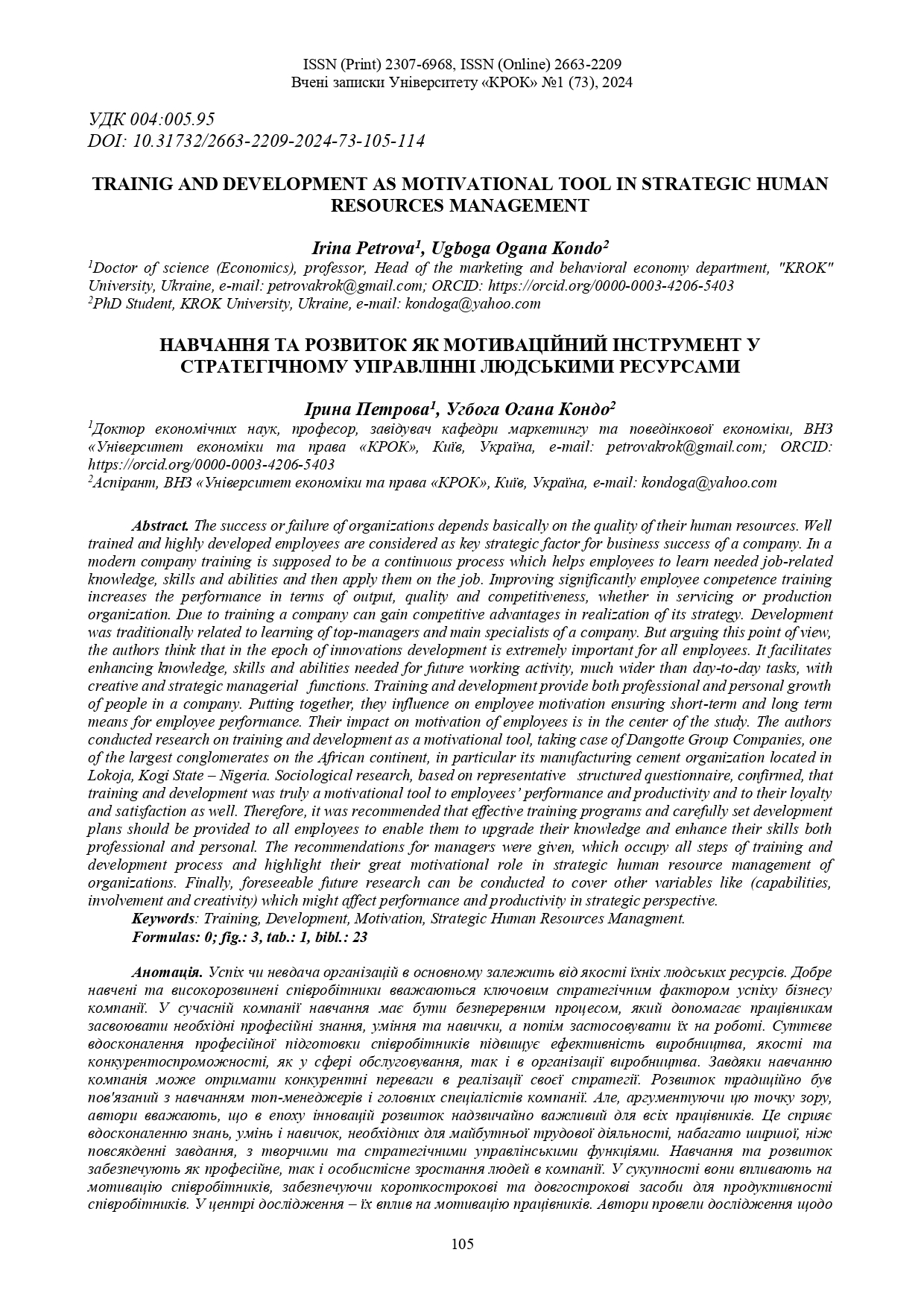TRAINIG AND DEVELOPMENT AS MOTIVATIONAL TOOL IN STRATEGIC HUMAN RESOURCES MANAGEMENT
DOI:
https://doi.org/10.31732/2663-2209-2024-73-105-114Keywords:
Training, Development, Motivation, Strategic Human Resources ManagmentAbstract
The success or failure of organizations depends basically on the quality of their human resources. Well trained and highly developed employees are considered as key strategic factor for business success of a company. In a modern company training is supposed to be a continuous process which helps employees to learn needed job-related knowledge, skills and abilities and then apply them on the job. Improving significantly employee competence training increases the performance in terms of output, quality and competitiveness, whether in servicing or production organization. Due to training a company can gain competitive advantages in realization of its strategy. Development was traditionally related to learning of top-managers and main specialists of a company. But arguing this point of view, the authors think that in the epoch of innovations development is extremely important for all employees. It facilitates enhancing knowledge, skills and abilities needed for future working activity, much wider than day-to-day tasks, with creative and strategic managerial functions. Training and development provide both professional and personal growth of people in a company. Putting together, they influence on employee motivation ensuring short-term and long term means for employee performance. Their impact on motivation of employees is in the center of the study. The authors conducted research on training and development as a motivational tool, taking case of Dangotte Group Companies, one of the largest conglomerates on the African continent, in particular its manufacturing cement organization located in Lokoja, Kogi State – Nigeria.Sociological research, based on representative structured questionnaire, confirmed, that training and development was truly a motivational tool to employees’ performance and productivity and to their loyalty and satisfaction as well. Therefore, it was recommended that effective training programs and carefully set development plans should be provided to all employees to enable them to upgrade their knowledge and enhance their skills both professional and personal. The recommendations for managers were given, which occupy all steps of training and development process and highlight their great motivational role in strategic human resource management of organizations. Finally, foreseeable future research can be conducted to cover other variables like (capabilities, involvement and creativity) which might affect performance and productivity in strategic perspective.
Downloads
References
Asfaw, M. Argaw and L. Bayissa, (2015) "The Impact of Training and Development on Employee Performance and Effectiveness" A Case Study of District Five Administration Office, Bole Sub-City, Addis Ababa, Ethiopia, Journal of Human Resource and Sustainability Studies, Vol. 3, 188-202
Asare-Bediako, K.: (2002). Professional skills in Human Resource Management. Accra. Kasbed Ltd. Bulletin of the Transylvania University of Braşov Series V: Economic Sciences. Vol. 7 (56) No. 1.
Ewuim N. C and Ubochi l (2007): Principles of Personnel Management in Nigeria Lagos: Dominica Publishers.
Fisher, C.D. (2000). Mood and Emotions While Working: Missing Pieces of Job Satisfaction. Journal of Organizational Behavior, 21, 185-202.
Bielova O., Petrova I. Personnel marketing in company's compensation policy // "Scientific Notes of the University "KROK", 2020. - № 4(60). - P. 115-120
H. Falola, A. Osibaanjo and S.Ojo, (2014) "Effectiveness of training and development on Employees’ performance and organizations competitiveness in the Nigerian Banking Industry"
Igalens, J., & Roussel, P. (1999). A Study of the Relationship between Compensation Packages, Work Motivation and Job Satisfaction. Journal of Organizational Behavior, 20, 1003-1025.
Kennedy, P.E, Chyung, S.Y, Winiecke, D.J., Brinkerhoff, R.O. (2013). Training Professionals’ usage and understanding of Kirkpatrick’s Level 3 and Level 4 Evaluations. In: International Journal of Training and Development, 18:1.
Nick Blanchard and James W. Thacker (2007). Systems, strategy and practices (3rd edition).
Mehrdad, A., Mahdi, S., Ali, S. (2009). A Study of on the Job Training Effectiveness: Empirical Evidence of Iran. In: International Journal of Business and Management, Vol. 4, No. 11, p. 63-68.
Okauru, I. O. (2011). Emerging Issues in Tax Administration: The way forward for Nigeria. July 12. Being Lead Paper presented at the 4th National Conference of the Department of Finance. Faculty of Business Administration. University of Lagos, Nigeria.
Organization for Economic Cooperation and Development (OECD, 2016), Tax revenue (indicator). doi: 10.1787/d98b8cf5-en (Accessed on 22 February 2016)
Raja Khan, Furqan Khan, and Muhammad. Khan, (2011), “Impact of Training and Development on Organizational Performance" Global Journal of Management and Business Research, Volume 11, Issue 7, Version 1.0
Raimi, L., Saura, I.B. & Fadipe, A. O. (2013). Role of Economic and Financial Crimes Commission (EFCC) and Independent Corrupt Practices & Other Related Offences Commission (ICPC) at Ensuring Accountability and Corporate Governance in Nigeria. Journal of Business Administration and Education. Volume 3, Number 2. Retrieved from infinitypress.info/index.php/jbae/article/…
S. Aigbepue and E. Mammud, (2012), “Training, development and organizational performance". JORIND 10 (3), December. ISSN 1596 - 8308. www.transcampus.org./journals, www.ajol.info/journals/jorind
Storey, David and Westhead, Paul. (1997) Management Training in Small Firms – a Case of Market failure? Human Resource Management Journal/volume 7, Issue 2.http://www.easytraining.com, Claire Belilos, Cross-Training as a motivational and Problem-solving Technique.
Soeze, S. A. (2004). Managing the Challenges of Fighting Corruption in Nigeria. THE WEEK. October 25. Vol.20, No.22. Lagos: Sub-Sahara Press Limited
The Federal Republic of Nigeria (1999). Constitution of the Federal Republic of Nigeria. Lagos: Federal Government Press.
U. Hafeez and W. Akbar (2015) “Impact of Training on Employees Performance” Evidence From Pharmaceutical Companies in Karachi, Pakistan. Business Management and Strategy, Vol. 6, No. 1
Venkatesh, V., & Speier, C. (1999). Computer Technology Training in the Workplace: A Longitudinal Investigation of the Effect of Mood. Organizational Behavior and Human Decision Processes, 79 (1), 1-28
W. Dabale, N. Jagero and M. Nyauchi (2014) “The Relationship between Training and Employee Performance" The Case of Mutare City Council, Zimbabwe. International Journal of Human Resource Studies, 2014, Vol. 4, No. 4, pp 61-72.

Downloads
Published
How to Cite
Issue
Section
License

This work is licensed under a Creative Commons Attribution-NonCommercial 4.0 International License.

